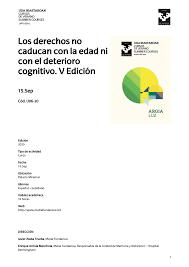Rights, autonomy and dignity. "Rights do not expire with age or cognitive impairment". Issue IV
The communication of a diagnosis of certainty of a serious illness is always sensitive about: do we have the capacity to make a diagnosis of certainty; do we have the capacity to make a prognosis of certainty; or only risk factors that make the problems evolve better or worse; and do we have the capacity to make a prognosis of certainty; or only risk factors that make the problems evolve better or worse?
Certainty and uncertainty are different factors on the emotional impact of a terminal diagnosis in a degenerative disease such as AD (Alzheimer's disease), both for the affected person and for the family. How do I manage this?
Do rights and competence expire when we reach a certain stage of illness? What should be the duties and values of the health and social care professional?
Do environments, both urban and at home or in institutions, have an influence on the Alzheimer's sufferer; can things be made easier with friendly cities; what are friendly cities for an AD sufferer? These are questions that we will try to answer during the course of the course.
Objectives
- To improve knowledge about Alzheimer's disease.
- To present tools for assessment and intervention.
- To learn about and reflect on ethical dilemmas.
- To learn about the importance of the environment in the evolution and symptomatology of the disease.
- To address the most relevant problems in the care of people with dementia.
- To improve interdisciplinarity and personalised care based on respect.
- To raise awareness in society, and among professionals in general, of the attentional problem of dementia.
Professionals
Other Professionals
- Enrique Arriola
- Amaia Zulaica




